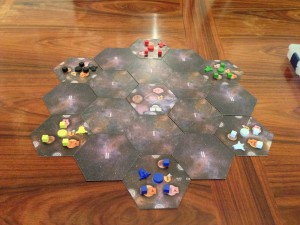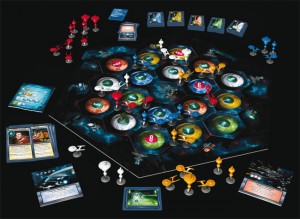Friday Night Unplugged #14.1: Eclipse: New Dawn for the Galaxy
- Updated: 22nd Feb, 2013
Lo and welcome to another weekly edition of Friday Night Unplugged. This week we’re delving into the first part of our look into one of the top-rated games on Board Game Geek – Eclipse: New Dawn for the Galaxy. It’s one of the games I’ve had recommended to us time and time again so figured it was about time I checked it out.
Eclipse is a big game, so I’ll be covering it in two parts. This week I’m going to explain the details and also explain what we, the FNU group, liked about the game. Next week I’ll be dedicating a whole column to a play session report, plus the final sign off on Eclipse. There are a few reasons for this.
- Eclipse is huge. I’m talking coffin box, oh my days huge.
- Eclipse is complex. The twisty, fascinating, fun kind.
- To truly appreciate and demonstrate Eclipse I need more time and space than this column would usually allow. Rather than turn your brains into mush with a wall of text I’d rather break it up and give you time to digest.
- I want to do it justice.
What is It?
Eclipse is a 4X space game. 4X stands for Explore, Expand, Exploit and Exterminate. These are the cornerstones of any empire and the foundations at the very heart of Eclipse. Each player takes on the role of their own empire. There are 6 standard human empires to choose from or 6 alien empires that have their own special rules. Each empire starts in their own sector around the edge of a central ring of sectors which (other than the very central sector) are all faced down representing unexplored space. Let’s take a look at the picture below as an example.
What we have here is a basic 6-player setup. In the centre is the central point of the map.[No! Really? – Ed.] Around the edge of that we have 2 different levels of space containing more resources etc.
Each player has a starting sector with 3 planets, each of which produces a different coloured resource. Pink produces Science, Orange produces Money and Brown produces Materials.
The coloured cubes on them are taken off the relevant track on the playerboard and allow the player to generate the resources those planets create.The problem is that to create resources you need to have influence over said sector.
See those little round disks in the centre of the tiles? They’re influence disks. You get a track full of them at the start of the game. Every time you place one on an empty sector, to gain control of it you remove it from the track and increase the amount of money you have to pay out at the end of your turn.
The same happens every time you take an action. You move one disk, from your track onto the relevant action space on the board. At the end of your turn you get the disks back but only from the board. Sectors require actions to remove their disks, which means spending more disks.

This shot from Board Game Geek shows off a section of a player sheet with influence track at the bottom, materials to the left and actions on the right. In this case he’d lose 10 money at the end of this round.
You still with us? [Not even a little bit – Ed.]
Alongside the economic functions, players can perform a variety of actions. They can explore new sectors attached to sectors they control. They can build ships to scoot around space with and fight player enemies or randomly drawn “Ancients”. They can research new technologies that can help they build better ships or earn more from their planets. They can upgrade ships they’ve built or extend their reach as a species. The best part? Players can perform as many of these actions per turn one by one until all the players have consecutively passed.
Ok, that sounds complicated. Why is it so great?
That’s exactly it; it is complicated but that’s also what makes it beautiful. Every choice you make has an impact on the rest of the game. Every action costs you. Every sector full of resource-producing planets also saps your resources. You can choose whether to kit your ships out with extra shields but then you’ll need a better energy source for them, so make sure you have the right technology. Now you’ll need to spend some of your rare science resources and an action to do so. Then you’ll have to spend another action to upgrade them and now you’re in that awkward position where you know you need to move your ships for the next turn but the others have noticed your fortifying your space death machines.
Eclipse is a beautiful game of resource management and control. It succeeds where Catan fails by going on for hours and hours because Eclipse actually has an endgame. You have nine rounds of play. Nine rounds to take your empire from fledgling explorers to space-controlling super-races. When those nine rounds are up, whoever has the most Victory Points wins. There’s also no single way to earn VPs. Sectors that you own gain you them, alliances you make gain you them and combats you succeed in get you them. Players who want to play peacefully can, those who want to just rule by force are capable of doing so and if you want to win solely on scientific advancement it’s perfectly capable. Regardless of which way you play, if you manage your empire right you can win.
I’m new to tabletop games. Is Eclipse for me?
The simple answer is… no. Eclipse is difficult to set up for the first time. The rulebook is as vague as it is tome-like and the sheer number of pieces will scare you away from games for life. It does have its problems, even for experienced players, but they are easy to overcome with a few games.
After the first play through it’s easy to see the sheer depth of choice Eclipse presents for all types of players. It also gets increasingly faster to set up the game in the first place, making for a much smoother experience.
What can we expect next week?
Next week you’ll be treated to a full play report from a 3-player game of Eclipse. No matter how much we talk here about how good it is or the effects of your decisions the only way to really appreciate it is to see/read it for yourself. A single turn won’t get that across so we’ll be trimming it down and guiding you through here on Friday Night Unplugged next week. Check back with myself, Josh and Fi as we explore space, betray trusts and raise our military might into deep space in ECLIPSE: The Rayne Debacle (coming soon to a screen near you)




2 Comments